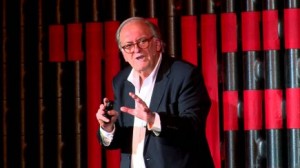If somebody could care to quantify the cost of constantly checking with people whether they are doing what they are supposed to do, we would come up with a horrible ROI. Checking is the greatest source of organizational ineffectiveness. When checking, particularly constant checking, is not in the DNA, organizations are very effective. The opposite, checking as a habit, a culture of checking, is an effectiveness nightmare.
We have mistaken ‘management’ with ‘checking’, at high cost. When managers become policemen and information traffic wardens, we get a bureaucratic culture.
When the German sociologist, Max Weber (1864-1920), wrote about bureaucracies, he said this about the bureaucratic legal system: “The modern judge is a vending machine into which the pleadings are inserted together with the fee and which then disgorges the judgement together with the reasons mechanically derived from the Code.”
We have many ‘vending machine managers’ in our organizations, which have given a bad reputation to so-called ‘middle management’. Personally, I do not share the standard view that middle management is responsible for all the ills of the organization, that they are resistant to change, withholders of information and, in general, not very nice, obstructive people. It does not have to be like this. The problem is that we have to reinvent management to get away from the partial truth of those stereotypes and from the model of ‘checking and policemen’. Middle management has a key role in maintaining corporate memory, not a small detail.
Could you imagine a culture where you don’t have to check much for performance? Where all your checking is strategic and for results? Could you imagine what would happen to trust in that organization?
By any account, the cost of checking is very high. For those hard skilled leaders who mainly understand numbers, this is not a difficult math to crack: number of meetings down by x%, add this to employees time focused on delivery and not on reporting to the boss every other day, equals Y savings and Z productivity gains.
If you fancy a good cost reduction programme, stop checking.
________________________________________________________________________________________________
Dr Leandro Herrero is the CEO and Chief Organization Architect of The Chalfont Project, an international firm of organizational architects. He is the pioneer of Viral ChangeTM, a people Mobilizing Platform, a methodology that delivers large scale behavioural and cultural change in organizations, which creates lasting capacity for changeability.
Dr Herrero is also an Executive Fellow at the Centre for the Future of Organization, Drucker School of Management.
An international speaker, Dr Herrero is available for virtual speaking engagements and can be reached at: The Chalfont Project.
Leandro Herrero is frequently voted ‘Best Speaker’ at conferences worldwide. He also speaks to Boards and Leadership Teams, participates in other internal company conferences as a keynote speaker, and is available to run short seminars and longer workshops.
The topics of Leandro Herrero’s presentations and workshops relate to his work as an organizational architect.




Would you like to comment?